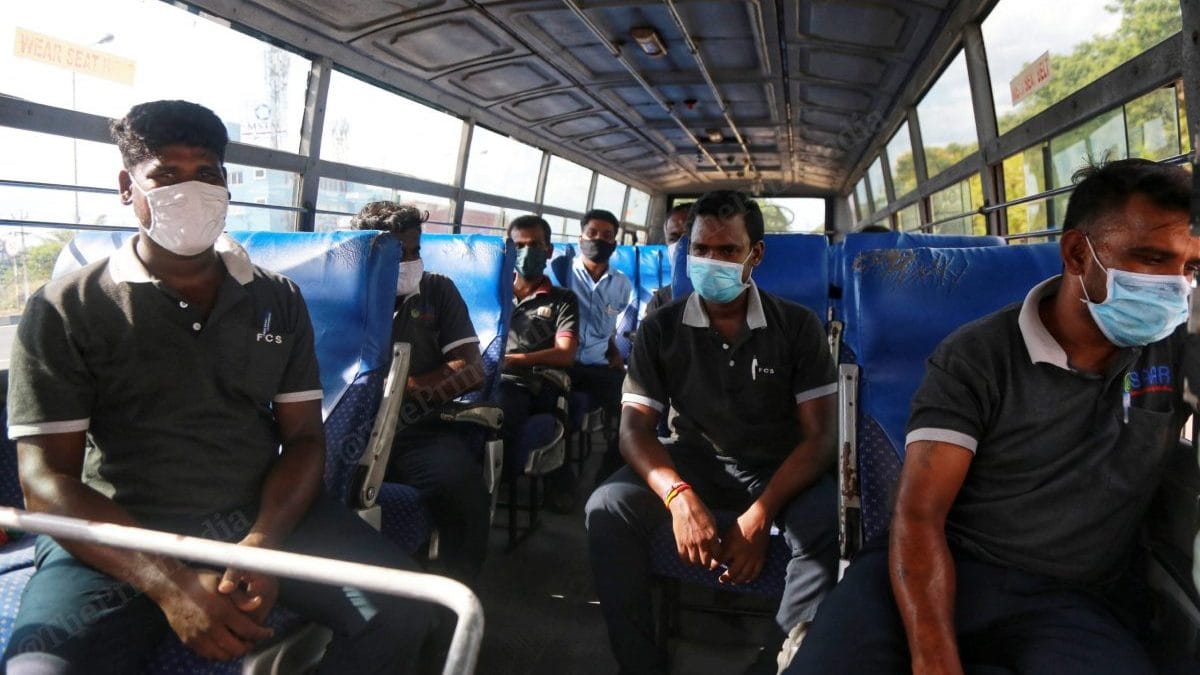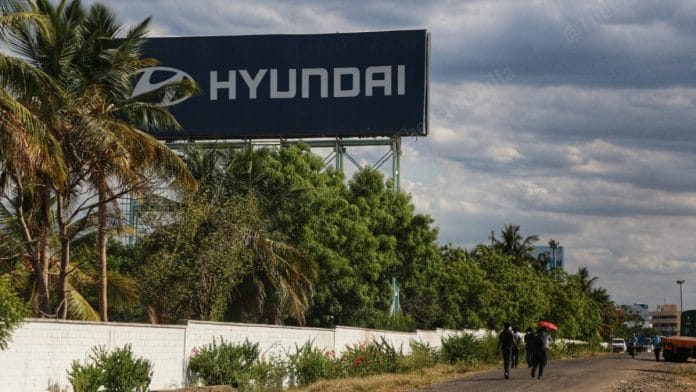Sriperumbudur: Chennai’s automotive corridor, which spans over 60 km in the outskirts of the city and has earned the city its Detroit of India tag, is now limping back to normalcy after nearly two months of lockdown.
Most of the factories and manufacturing units shut down days before the lockdown on 25 March but many have been up and running since the second week of May. Some such as CEAT Tyres, however, continue to remain shut.
Among the first factories to resume production was the Hyundai unit at Irungattukottai in Sriperumbudur.
Spanning over 530 acres, the factory is Hyundai’s only manufacturing unit in the country. The South Korean firm is the second largest carmaker in India.
The manufacturing unit shut days before the lockdown was officially announced on 24 March, and reopened on 8 May, manufacturing 200 cars on the first day.
Also read: Chennai’s fishing industry is buzzing again as lockdown-hit lean season comes to an end
Production during Covid, the Hyundai way
The company claims to have put in place a very “comprehensive set of safety and sanitation measures” before it reopened.
“Hyundai has very effectively balanced the twin needs of employee safety and wellness and restarting economic activity by commencing the factory operations on 8 May 2020 after putting in place a very comprehensive set of safety and sanitation measures and getting all government clearances,” a Hyundai spokesperson told ThePrint.
A senior official in the company, who did not wish to be named, further explained that while the focus was on Covid-19 and its mitigation, there was also a need to concentrate on the economy.
Prior to the lockdown, the factory had anywhere between 13,000 and 15,000 workers. These comprised approximately 4,500 employees, upto 3,000 trainees and 5,000-6,000 contractual workers. Since it reopened, the factory has around 7,000-7,500 employees working in all.
The factory functioned throughout the day through three shifts — starting at 7 am, 3:30 pm and 10 pm. “All these shifts were for approximately 8 hours,” said the senior employee. “Now we have a much smaller staff coming, which functions on one shift, from 7 am to 3:30 pm.”
The carmaker used to manufacture up to 2,500 cars a day or two cars in a minute before the lockdown. The Hyundai spokesperson told ThePrint that since resuming operations after 8 May, the “overall sales (for Hyundai in May) was 12,583 units, of which 5,700 cars were exported, which is a positive sign of business activity gradually starting again”.
Asked about the extent of the loss the company incurred being shut for more than 40 days, the company spokesperson refused to comment. “Our operations have been in line with our Business Plan and Operating Plan for the year.”
The company also refused to comment on whether any of its employees have tested positive, though it had on 24 March announced that three of its employees had showed symptoms such as cough and cold and then tested positive for Covid-19.
“In the first week of our plant operations, three of our employees have shown mild symptoms of cough and cold and were immediately asked to meet a medical expert team for further evaluation. They subsequently tested positive for Covid-19 and immediate medical attention was provided to them,” the company statement had noted then.
Workers in the factory
For Bharathi Desan and Ram Kumar, two contractual workers in the Hyundai unit, the lockdown wasn’t that tough a period as the company had paid them during that period even though they didn’t have any work.
But with operations resuming, the company has decided to pay only those workers who turn up for work. “The company specified that going forward they would only pay workers who show up at work,” Kumar said.
The two men have been working at the plant for the past 10 years and their work mainly focuses on engine packaging. They both live in Ocheri in Vellore district and are picked up by the office for the roughly 65-km commute to the factory plant in Irungattukottai, Sriperumbudur.
Since their shift begins at 7 am, the bus comes at 5-5:30 am.
Two other contractual workers in the factory, Sita Madhu and Ashok Kumar, originally from Odisha’s Bhadrak and Balasore districts, respectively, told ThePrint that they have been taking all precautions and therefore were not scared of the virus. “We wear a mask at all times, use a sanitiser regularly and always maintain distance between each other,” Madhu said.

Hyundai explained that there were elaborate standard operating procedures for resuming duty with regard to workers’ health and fitness. The company specified that various arrangements had been made to ensure that employees were “absolutely safe” from the time they leave for work till they get back home.
“The buses that transport our employees from home to work and back have been completely sanitised and are accommodating around half the usual capacity to ensure strict compliance of social distancing,” the company spokesperson said. “The food served in the canteens have been carefully planned to promote good health and build immunity naturally.”
Apart from Hyundai, the Chennai automotive corridor has companies like Ford Motor, BMW, Renault and Nissan operating their plants. It stretches from Gummidipoondi, 50 km north of Chennai to Maraimalai Nagar, 35 km south of Chennai, and crosses through Tiruvallur, Oragadam and Sriperumbudur.
The corridor, the success of which is often credited to former chief minister J. Jayalalitha, accounts for over 30 per cent of commercial vehicles, more than 20 per cent of passenger vehicles and over 35 per cent of automotive parts in the country. It is also responsible for Tamil Nadu being among the top 10 automobile hubs in the world.
Also read: Tsunami, fire, floods, Covid — the IAS officer who has led fight against disasters in Tamil Nadu






